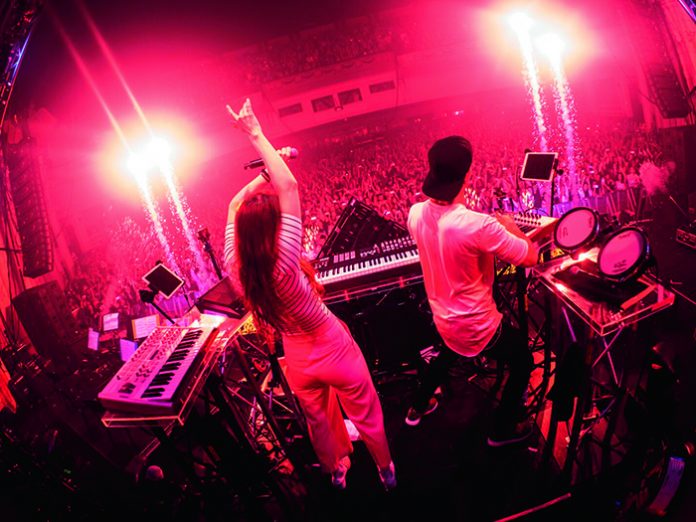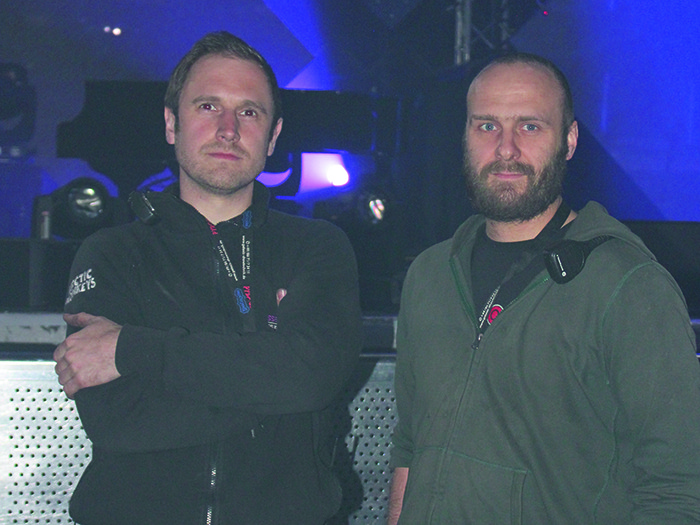TPi’s Ste Durham was at O2 Academy Brixton to see a versatile touring rig put through its paces, courtesy of DJ, songwriter, producer and musician, Kygo.
Kygo, otherwise known as 24-year-old Norwegian Kyrre Gørvell-Dahll, has enjoyed a rapid ascent in recent years as one of the leading proponents of ‘tropical house’. The artist’s Cloud Nine tour kicked off with a handful North American shows in January of 2016, before continuing through mainland Europe and the UK in March and April. The tour has taken the artist and his crew into venues of all shapes and sizes, ranging from large arena spectaculars to more intimate academy sets, many of which required an adapted version of the original touring set up.
Although production had been scaled back once Kygo returned across the Atlantic, the UK rig was stepped up for two nights back-to-back at London’s O2 Academy Brixton. Production Manager Joel Stanley explained: “The European tour was an extension of the larger US shows we had done previously as ‘warm ups’, but playing to rooms holding up to 13,000 people was quite the baptism of fire for everyone, which was a positive thing in retrospect. This has been the biggest and only tour that Kygo has done and I’m pretty sure that the same for some of the team too.”
Much of the crew had been brought in for the Cloud Nine tour, with groundwork staring in October of 2015. Stanley therefore had to use suppliers he had built relationships previously, such as PRG XL Video for the UK. This also meant that the crew could prepare at the PRG XL Video’s warehouse in Longbridge, Birmingham. PRG XL Video also introduced PRG Nocturne as video and lighting supplier for the US shows.
Stanley continued: “The week of rehearsals that we did for the US tour were a great help and meant that we could hit the ground running going into Europe, with only one tech day at the Heineken Music Hall in Amsterdam.”
Thinking On Your Feet
Another of Stanley’s regulars was SSE Audio Group, which provided 28 boxes of L-Acoustics K2, 12 L-Acoustics K-Subs, 24 L-Acoustics SB28 bass cabinets, 24 L-Acoustics KARA, six L-Acoustics ARCS2 cabinets, and eight L-Acoustics K1. The PA system was driven by a main rack of 26 L-Acoustics LA8 amplifiers. Motors and rigging consisted of four L-Acoustics K2BUMP Flying Bumpers for K2 and two L-Acoustics Kara/SB18 Flying Bumpers.
Avid Profile digital consoles were used at both FOH and monitors with Avid Venue stage boxes and racks, along with two Yamaha SPX2000 Effects Processors, two Midas XL48 eight channel pre amps and a Summit DCL200 Stereo Valve Compressor. While those on stage used a Sennheiser G3 EK300 IEM system, the crew employed a pair of L-Acoustics SB28 Sub Bass Cabinets and 10 L-Acoustics X15 HiQ Coaxial Cabinets for some on-stage thud.
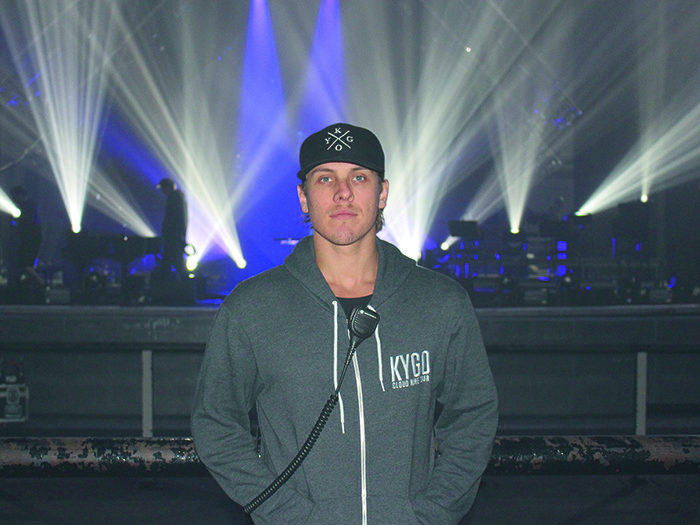
FOH Engineer Mark Scurr explained: “We adapted the system every day depending on the size and layout of the venue – in here we use a split array, with boxes hung high to cover the balcony and ground stacked boxes for the standing punters. It sounds great!”
The crew chose a split array to combat the audio problems endemic in Brixton Academy, namely an almighty slapback from the Art Deco façade of the venue’s upper circle.
“Sound just fires off the balcony in here. The split array is our way of trying to avoid that. It’s an inconsistent room but I’ve not heard a better rig in here – even up on the balcony itself sounds good, I wish I was mixing from up there,” Scurr laughed. “This is how you would have done it back in the day – ground stacked boxes and a couple more up top. We’re using new gear, but doing an old thing with it. It’s the brainchild of our System Tech, Perttu Korteniemi, as he’s had good results with the same thing in here before.”
Kygo is something of an anomaly in the EDM world, in that he uses more conventional instruments such as keyboards, electronic drums and synthesisers to create his music live. The two nights he performed in London also included an eight-piece string section and a number of guest vocalists such as Labrinth, Maty Noyes and Kodaline.
SSE also provided four BSS by Harman AR133 DI Boxes, two Radial Pro D8 eight-way rack mount DIs, eight DPA 4099 microphones for the strings, and a selection of Shure and AKG microphones for the on-stage vocalists. The backline was Kygo’s own, based around an Ableton set up that was kept off stage.
Scurr added: “The mix isn’t too bassy despite the fact we are essentially playing dance music. I try to let all of the instruments breathe, particularly now we have the strings on stage as well for certain songs. We do pummel people at times but it’s not a drum ‘n’ bass gig – it’s a dynamic show.”
Stole The Show
PixMob’s interactive LED technology was another of the weapons in Kygo’s arsenal at the Brixton show. PixMob’s Xavier Bégin-Leblanc explained: “Here with Kygo we are using our simplest LED wristbands. They only flash one colour, where our more sophisticated modules are capable of full RGB.”
During the US leg, the crew used 33% red, 33% white and 33% blue, given out around 75% capacity of the crowd for an even dispersion, though this was scaled back to just red for the London shows. The wristbands are fitted with microchips that trigger the LEDs inside to flash when washed with infra-red light.
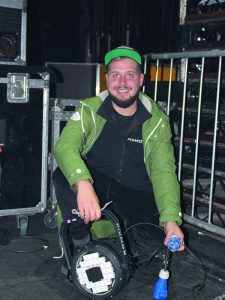
Bégin-Leblanc continued: “We manufacture the infra red lighting fixtures that are flown on the truss and operated using a standard desk, in my case an MA Lighting onPC command wing. The first five fixtures are always in the same place on the truss and we adjust the two extra at either end in order to cover the room completely.
“The main difference between visible and invisible light is that invisible light reflects a lot more, as if the whole room was covered in mirrors. This means we can aim the fixtures under the balcony to bounce around and hit dead spots.”
PixMob has been with Kygo from the first show of the tour at the Greek Theatre in Los Angeles, though it was originally hired for just three dates in the US. With crowds enjoying being part of the lighting rig and social media taking note, the decision was made to bring them across the pond for select dates.
“The wristbands are a very nice feature and people always talk about it after,” Bégin-Leblanc said. “They take them home as a souvenir and create good visibility for the tour on Instagram or Facebook, for example. The EDM industry is always about the light, which is why we are so well suited to it.
“A single person with a wristband isn’t impressive, but the more people there are, the nicer the effect is. They hand out the wristbands on the door and it gets people thinking about what they are used for or when they’ve seen it or heard about them before. It’s great to see people getting excited to become part of the show.”
Raging
The original concept for the video design came from the diamond shape of Kygo’s logo, which was was co-desinged by Myles Shear and Simon Evans, then put together by the previous production company using LED and Perspex panels. Stanley explained: “I redesigned the video wall with PRG using different resolution tiles. This creates an ‘X’ down the middle made of low resolution blow-through panels, which is surrounded by the higher res diamonds, it looks a lot cleaner now.”
PRG XL Video provided ROE MC-7 LED video tiles that were hung upstage to create six diamond shapes – a scaled down version of the 36 screens the artist had on his US leg. The resultant ‘X’, formed from the middle space between the four central diamonds, was filled with ROE MC-18 Hybrid LED tiles to create contrasting looks.
The fully customised animations came courtesy of design studio Visual Artform. The company’s Creative Director, Simon Evans, has worked with Kygo since the very early stages of his career: “Having already produced Kygo’s set at Coachella last year, we wanted to go even bigger for the 2016 tour. The new show delves deeper into an immersive visual experience, with each song being its own beautiful chapter within the epic
Cloud Nine story.’
Evans described how the visuals enhance Kygo’s theatrical tendencies: “His new track, Raging, for example, begins with a boat sailing across an ocean when suddenly a raging storm hits. As lightning formations rip through the geometric stage layout, the song ends with a boat wreckage at the bottom of the sea, a dramatic blackout then occurs allowing for a swift set change and for Kygo to appear in a new position on stage. Our objective is to use the visuals not only as a canvas to the music, but to create dramatic moments within the show and keep the audience captivated throughout.”
Touring Video Direcor Luke Hammonds used a 12-Core Apple MacPro running Arkaos GrandVJ and Madmapper software to take care of the visuals alongside a Blackmagic Studio 4k, which captures footage from eight cameras. The package consisted of strategically placed Bradley robocams and GoPro 4Ks for some extreme close up shots. Hammonds explained: “The camera footage is manipulated with customised scripts
developed by our programmers back in the studio to generate cool effects on the fly, which is then mixed live into the animations to show people that he is actually playing all of these instruments. We trigger the different camera angles to the BPM of the music for an overall look that blends more seamlessly with the show than plain camera shots you tend to see at other live gigs.”
The simplification of the rig did not stop at video, with numerous substitutions made within the lighting specification in order to save weight in smaller venues and space in fewer trucks. As well as this, Stanley pointed out that simple changes such as 4-lite molefays instead of 8-lites or Clay Paky Stormys over strobes saved on power consumption, storage, and budget.
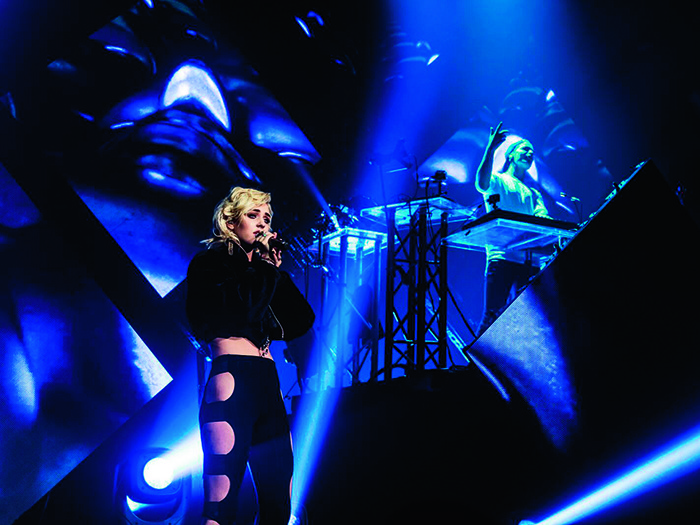
The flown rig, also provided by PRG XL Video consisted of 12 PRG Best Boy 4000 spots, 26 Clay Paky Sharpys, 20 PixelRange PixelLines LED battens, 20 Clay Paky Stormys, 24 4-lite molefays and 12 Clay Paky Mythos. This was reinforced by a floor package containing 24 Clay Paky Sharpys, 12 PRG Best Boy spots, 12 Clay Paky Mythos, 16 PixelRange PixelLine LED battens providing wash and fill-in lighting, 20 Clay Paky Stormy and 14 4-lite molefays. The rig was controlled from a Martin by Harman M6 Lighting Console.
Lighting Designer Alex Hesse was another member of the crew brought in to ensure that Kygo’s stage show evolved to a level on par with his successful recording career. Hesse said: “I’ve worked in EDM for years, particularly on the underground stuff. We always try to look at the show from a creative perspective and I always talk to the other visual guys for their input. I draw it up and programme it, planning the show from start to finish. Every step we build up moments and create opportunities for people to embrace his music – it’s all about experiencing that music in the best possible way.
“Lighting is key to this genre, and Kygo understands that. Steve Jobs said it doesn’t make sense to hire smart people and then tell them what to do; you hire smart people so they can tell you what to do. I believe the same applies on tour – Kygo has all faith in us, though I’ll always ask him after the show just to make sure he’s happy.”
The eventual European rig looked slightly different to its larger American cousin, but Hesse was more than happy with how the substitutions had performed on the road. He commented: “There are so many fixtures today that its easy to swap things in, if the budget requires you to. I make sure that they are all working hard to give the best possible experience for the crowd. If you have a fast car and you only drive slow there’s no point in having it, my job is no different. If you select a certain light then you have to maximise everything that it can offer you. It’s been tricky to adapt it from venue to venue, especially the smaller ones where we can’t fly everything, but I’m very pleased with how it looks.”
SFX
Quantum Special Effects teamed up with Kygo to supply the London and Amsterdam dates using a scaled back version of the arsenal deployed in the bigger North American venues. Quantum’s Project Manager Rob Edwards, who joined colleague James Waite on site, explained: “We made sure to work closely with the creative teams to create a tailored programme of effects that could fully compliment the changing themes and rhythm of the night. For the Brixton shows we’ve added to the touring package of eight CO2 jets, four confetti blowers and two stadium shots, with g-flames (on a canister-based system), LPG flame bars, and stage and flown pyro, all manufactured by Le Maitre.”
“The management comes to us and says what we can and cannot do with the space provided. Because we haven’t toured with it, fitting stuff in is a challenge, both physically and logistically, but there’s a great working atmosphere here that makes it easier. Everyone’s in the groove and you throw new stuff in on the last gig so you inevitably get in everyone’s way. It’s all fun and games really!”
Edwards was keen to point out that the show was still impressive despite the reduced rig, as it was generally being deployed on smaller stages like the one at Brixton. While this densely-packed arsenal may have potentially caused a H&S headache, Kygo’s well-choreographed show made life for the Quantum team a lot easier. Edwards continued: “Everyone is stationary bar the guest vocalists and the guys here are so on it anyway – nothing will be fired if there’s any possibile problems. This show in particular is easier to run than one where you’re having to spot band members or dancers – particularly as dancers tend to be wearing either not a lot, or very flammable costumes!”
Edwards also project managed the tour, making sure all the necessary documentation was filed and his team were well prepared. Almost echoing Hesse’s comments from earlier in the day, he concluded: “We have a really experienced bunch of guys on this tour so the whole thing was fairly straightforward. There is a fair amount of programming involved so that the cues are spot on but at the end of the day, anyone can push a button – it’s knowing when not to!”
Jumbocruiser provided coaches for Kygo’s European tour, which covered a total of 4,100 miles in only 30 days, while Fly By Nite provided trucking and on-site catering was provided by The Pantry Maid. Kygo is slated to appear at numerous European festivals this summer, including Radio 1’s Big Weekend in Exeter, and Wireless Festival in Finsbury Park in July.
TPi
Photos: Olav Stubberud
www.kygomusic.com
www.prg.com/uk
www.sseaudiogroup.com
www.visualartform.com
www.pixmob.com
www.q-sfx.com
www.jumbocruiser.com
www.flybynite.co.uk
www.thepantrymaid.com


